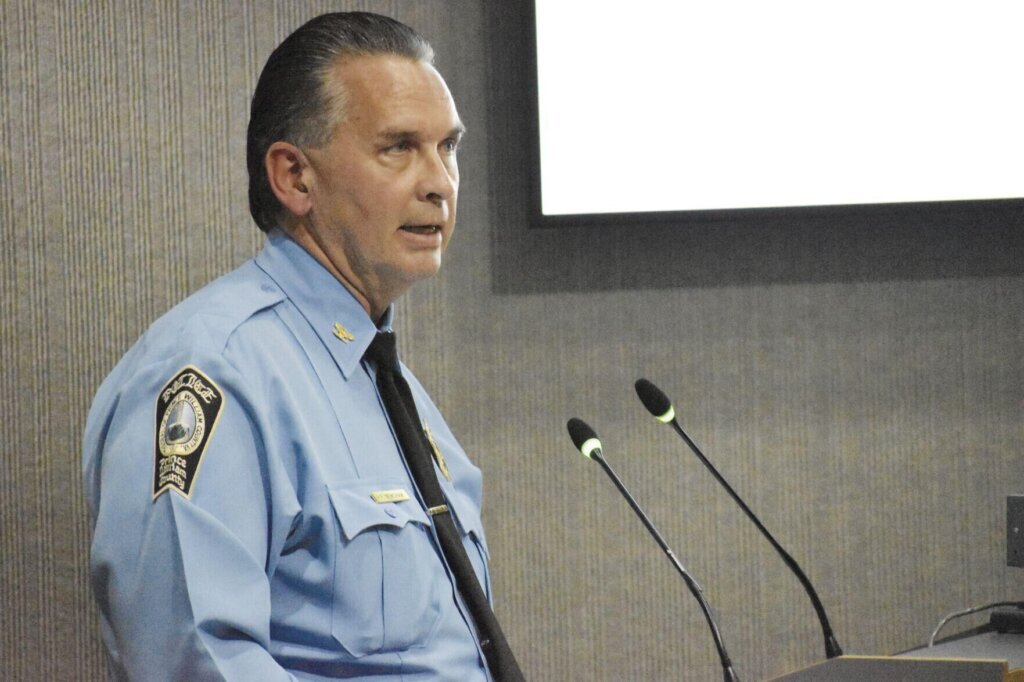A federal judge has overruled the District of Columbia’s attempt to toss a lawsuit claiming that, at his former job, Prince William County Police Chief Peter Newsham created a “watchlist” of lawyers, activists and journalists whose requests for public records would be delayed or denied.
Judge James Boasberg denied the district’s request to dismiss the lawsuit filed by attorney Amy Phillips. The suit claimed that Newsham, as chief of the Metropolitan Police Department, designated people whose requests would receive extra scrutiny to limit the release of information that “may lead to criticism of the department.”
On June 17, Boasberg set deadlines for a list of potential witnesses, discovery and a future status hearing.
Before being hired in Prince William, Newsham was chief of the Metropolitan Police Department from 2017 to early 2021, overseeing 4,500 employees. He has denied the allegations.
“There was not a watchlist,” he said in February. “Some of the folks who have reported on this issue, what I’ve asked them to do is read the lawsuit.”
Phillips’ lawsuit is based on information provided by Vendette Parker, who was MPD’s Freedom of Information Act officer from October 2017 to January 2020. The lawsuit is accompanied by a 12-page statement signed by Parker.
In her statement, Parker says that on her first day in the office, she was told by a supervisor that Newsham “felt he was being blindsided as the media and others confronted him with questions regarding records they had obtained from FOIA, records he was unaware had been released.”
Parker said she was advised of an “unofficial, unwritten policy that required the FOIA officer to notify Chief Newsham … of any FOIA request originating from the media, certain identified individuals, or requests for certain records.”
In its March motion to dismiss the lawsuit, the district appeared to place any potential blame at Newsham’s feet while alternately claiming both that no such policy existed and, if it did, that it would be in the district’s best interest to continue it.
The district argued that Phillips failed to “allege the existence of a current policy” and instead only applied to a theoretical policy instituted under Newsham.
The motion echoed Newsham’s claims that his policy was not aimed at restricting access to records, rather that he simply wanted to know what information was being released.
“Even taking plaintiff’s allegations as true, the alleged watchlist policy would merely involve a series of notifications that lead to MPD leadership’s awareness and oversight of certain FOIA requests and responses,” the district argues. “Ensuring the Chief of Police is adequately prepared to address high-profile matters in his public appearances is not a discriminatory motive behind any differing policies for handling FOIA requests.”
The motion argues that any burden imposed on those on the watchlist would be “minimal” and only add “some small amount of time.” The district says there’s no evidence it “would be unfavorable to those affected by it.”
“MPD has a substantial government interest in providing accurate information to the public, both for its own sake and for the sake of fostering public confidence in the police force,” the motion states.
The district argued that Phillips has no standing to sue because she has no outstanding FOIA requests, but Judge Boasberg countered that she has two pending. The judge says he found that information “from the District’s own FOIA public-access portal and is thus a matter of public record.”
The district also contends that it has authority under FOIA to limit certain disclosures. However, Boesberg wrote that the case centers on application of the law rather than a particular request.
After Boasberg denied the motion to dismiss, the district filed its response to the lawsuit, broadly denying the allegations. It says Newsham didn’t have any “direct or regular involvement” in the police department’s response to FOIA requests.
“The District denies the allegations … to the extent they are alleging that the District assessed FOIA requests for whether they “may lead to criticism of [MPD]” or had “the potential to embarrass [MPD],” the response says. “The District also denies the allegations … to the extent they are alleging that the District treated FOIA requests differently based on the identity of the individual submitting the FOIA request.”
Boasberg scheduled discovery to end by March 15, 2023, with the next hearing set for March 16, 2023.








